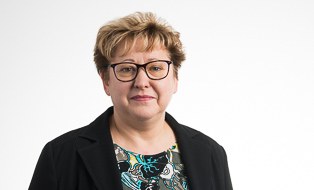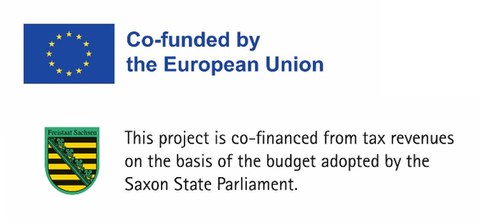3rd call for funding for the "Future of Vocational Training" guideline: Creating new formats for initial and continuing vocational training
Directive of the Saxon State Ministry of Economic Affairs, Labor, Energy and Climate Protection for the promotion of vocational training within the framework of ESF Plus 2021-2027 (ESF Plus Directive Future Vocational Training) of May 17, 2022, last amended by the directive of July 12, 2024.
The future viability of initial and further training courses requires the continuous further development of existing initial and further training courses with regard to didactic and methodological design using technology and digitally supported teaching and learning tools. There is also a need to use technological progress to develop new, needs-based vocational training courses. In order to make a sustainable contribution to strengthening the competitiveness of the Saxon economy, the following two funding priorities are to be promoted:
1. the development, introduction and practical testing of innovative, digitally-supported initial and further training courses using digital teaching and learning tools that support initial and further vocational training in a modern and sustainable way. In particular, innovative approaches are to be promoted that take into account the changed demand structure in terms of flexibility, interactivity, practical relevance and independence of location.
Examples include
- Digital learning platforms,
- blended learning concepts,
- virtual reality (VR) and augmented reality (AR),
- e-learning and mobile learning,
- digital collaboration tools and multimedia (learning materials: videos, tutorials, podcasts),
- gamification or
- Artificial intelligence (AI) et cetera
2. the optimization and further development of existing digital training and further education offers through the didactic-methodical design using technology- or digitally-supported teaching-learning tools and their practical testing.
The use of digital tools in initial and further training should be geared towards learning success and learning transfer, both in the development and in the optimization and further development of digital vocational training courses.
In addition, the results of both funding priorities will be evaluated in terms of their benefits and transferability to other companies. The funding priorities can also be combined with each other.
The variety of possible contributions is not restricted by concrete specifications for individual subject areas. The decisive factor is the consideration of the regulations of the guideline and the technical and content-related requirements for project selection in accordance with section 4.6 of this announcement.
However, the integration of interdisciplinary approaches is expressly welcomed. Projects that combine different specialist disciplines and perspectives contribute to the creation of synergies and the development of innovative solutions.
Participation in specialist events at the initiative of the SMWA is part of the objective of promoting professional exchange, knowledge transfer and networking among grant recipients.
| Type of funding: | the grant is awarded as project funding / partial funding |
| Funding rate: | up to 80% |
| Recommended duration: | Max. three years |
Eligible expenditure:
The following expenses/costs are granted as a lump sum:
- Personnel expenses
- Travel and transportation allowance for participants
- Expense allowance for participants per day of attendance
- 20% residual costs (all other eligible expenses and costs) of the direct eligible personnel costs
- For expert opinions, studies, scientific support, coordination and all remaining projects, the residual costs amount to 40% of the direct eligible personnel costs
The own contribution amounts to at least 20% of the total eligible expenditure (depending on the relevance of the aid). Contributions in kind, municipal funds, federal funds and also private funds can be used to provide the own contribution. Furthermore, all income related to the purpose of the grant and generated during the implementation of the project can be used to cover the costs.
Recipients of the grant:
Eligible applicants are natural persons with entrepreneurial status and/or legal entities or associations of persons under private and public law that have their registered office or branch in the Free State of Saxony.
Projects can also be carried out jointly by several eligible stakeholders (so-called cooperation projects).
Target groups:
The content of the projects must be aimed at the following persons
- Employees
- trainees
- retrainees
- dual students
- working students
- Interns
- People close to the labor market or capable of training/young parents in direct transition to work or training
- Small and micro enterprises and medium-sized companies
- Entrepreneurs and the self-employed
Project-specific conditions:
- Participants must have their main place of residence or place of work or training in the Free State of Saxony
- Participating companies must have their registered office or branch in the Free State of Saxony
- A positive selection decision has been made by the SAB and the relevant regional network players
- Minimum funding amount of EUR 50,000
The application and approval body is the Sächsische Aufbaubank (SAB). Approval is implemented in a multi-stage procedure
1. formal review of project outlines
After submission of the project outline (in electronic form) by April 30, 2025, the formal review is carried out by the SAB.
2 Evaluation of the technical content of project outlines
The technical and content evaluation is based on criteria (SAB form VD 60716). In addition to the SAB, the regional specialist alliances will be involved in the selection process as jury members according to the place of implementation.
3. invitation to submit an application or rejection
Early commencement of measures at the applicant's own risk will be approved in writing by the SAB upon receipt of the application. Without a positive selection decision by the jury, the project outline will be rejected.
The duration of the technical evaluation is approx. six weeks in each case.
Proposals must be submitted via the EPC. Since the directive is new, a joint consultation with the EPC and the SAB in advance is strongly recommended.
- SAB Website Future Vocational Training
- Future of vocational education and training funding module
- Presentation on the call for projects on digitalization
- FRL Future Vocational Education and Training - ESF-Plus 2021-2027
- Communication from the Vice-Rector Research 2/2023
- Information event: third funding call for the ESF guideline "Future of Vocational Education and Training"
*only available in German
Contact at EPC:

Project Manager
NameMs Ines Synnatzschke
ESF, ERDF/JTF
Send encrypted email via the SecureMail portal (for TUD external users only).
Visiting address:
FAL Falkenbrunnen BT-A Würzburger Straße 35
01187 Dresden
 © TU Dresden
© TU Dresden
Project Manager
NameMs Liane Henigschmidt
ESF, ERDF/JTF
Send encrypted email via the SecureMail portal (for TUD external users only).
Visiting address:
FAL Falkenbrunnen BT-A Würzburger Straße 35
01187 Dresden

